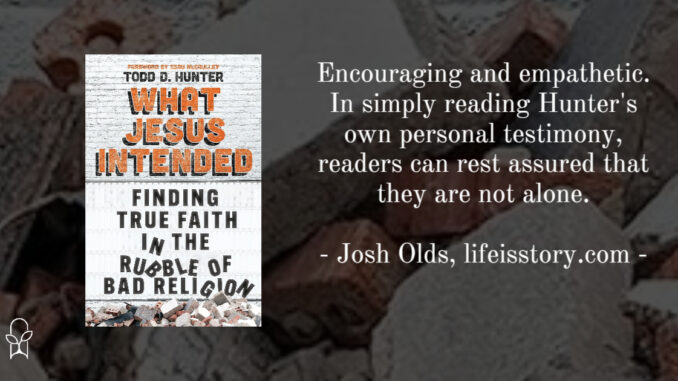
Published by IVP on July 18, 2023
Genres: Non-Fiction, Christian Life
Buy on Amazon
Goodreads

Have you lost your footing in church? Or has the church lost its footing? Many of us feel unsteady, disoriented, even crushed after an endless string of scandals within the walls of a place meant to offer compassion and safety. Others feel forced to draw back or distance ourselves from the church. All the while, our instincts tell us this is not what Jesus wanted for his people. But what did he intend? After four decades of ministry, Anglican bishop Todd Hunter is no stranger to betrayal and pain in the church. Still, he has hope. He believes more than ever that Jesus is who the world needs and that Jesus has plans for his followers. In What Jesus Intended, Hunter offers a vision for emerging from the rubble of bad religion and rebuilding faith among a community of sincere believers. By unpacking the purposes of Jesus, we can expose twisted, toxic religion for what it is and embrace the true aims of the gospel. Come for a fresh hearing of Jesus—one that offers us the healing and goodness we've always longed for.
The title of What Jesus Intended: Finding True Faith in the Rubble of Religion left me a bit uncomfortable. On one hand, I absolutely believe that the name of Jesus has been co-opted for the purpose of power. On the other, it leaves me thinking of the “No True Scotsman” fallacy that basically defends one’s position by saying “Well, no true ______ would ever do that.” Moreover, with perhaps a few exceptions, those who are using the name of Jesus absolutely believe they are following what Jesus intended. I would surmise that if we dug deeply enough into author Todd Hunter’s own theology, we would undoubtedly find ways in which his beliefs of what Jesus intended are different than mine. The setup in the title creates an “us vs. them” mentality where Hunter appears to be discounting those he believes are twisting the words of Jesus, asking the doubters and deconstructers to instead listen to his version as the “true faith.”
But if past the title, you’ll see that Hunter isn’t exactly trying to do that. Instead, he points out where the church has failed while naming them as the church. He admits that the church has often gotten things wrong and continues to get things wrong. He acknowledges that churches of virtually every background have been plagued with scandals related to sex and power. He validates the concerns that many people—especially young people—have about the institutional church. And then he lays out a blueprint for a different type of church.
Each chapter of What Jesus Intended balances between the acknowledgment of “bad religion”—often using examples from Hunter’s own experience—and how these examples don’t align with the characters or person of Jesus. What Jesus Intended is grounded in Hunter’s personal experience, including his own disillusionment with the church. He describes his journey through church hurt caused by various scandals involving extramarital affairs, drugs, and spiritual abuse, leading him and his wife to spend several years unaffiliated with any church community. I found that part to be very impactful personally a pastor currently unaffiliated with a church community. Each chapter also ends with some insightful questions for reflection and practice, helping readers take some steps to making practical change in how they approach or think about church.
In the end, What Jesus Intended is encouraging and empathetic. In simply reading Hunter’s own personal story readers can rest assured that they aren’t alone and that their reservations about the church are shared by someone who hold the title of Bishop. It reminds readers that there is another way of doing church. This book isn’t a manual on ecclesiology or missiology. It doesn’t get down deep in what needs to be done to revive the church institutionally. Rather, Hunter’s intention is to be exhortative and compassionate, offering a hopeful path for Christians seeking to rediscover their faith through a deeper understanding of Jesus’s character and intentions.
